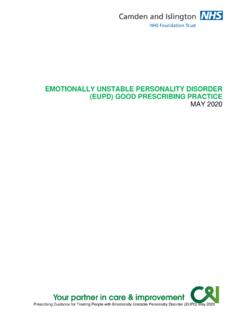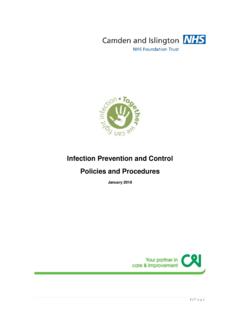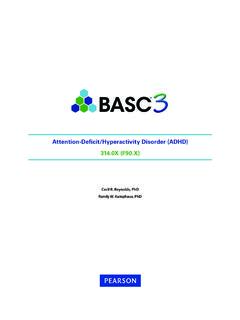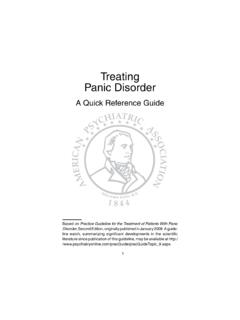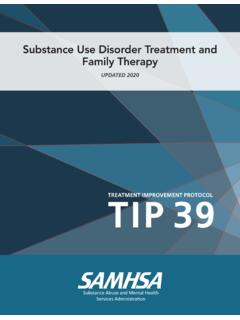Transcription of EMOTIONALLY UNSTABLE PERSONALITY DISORDER (EUPD) …
1 Prescribing Guidance for Treating People with EMOTIONALLY UNSTABLE PERSONALITY DISORDER (EUPD) May 2020 EMOTIONALLY UNSTABLE PERSONALITY DISORDER (EUPD) GOOD PRESCRIBING PRACTICE IN BRIEF MAY 2020 1 EMOTIONALLY UNSTABLE PERSONALITY DISORDER (EUPD) GOOD PRESCRIBING PRACTICE - MAY 2020 Policy title Prescribing Guidance for Treating People with EMOTIONALLY UNSTABLE PERSONALITY DISORDER (EUPD) In Brief Policy reference Policy category Clinical - Medicines Relevant to All Trust Staff involved in Treating People with EMOTIONALLY UNSTABLE PERSONALITY DISORDER (EUPD) Date published May 2020.
2 Implementation date May 2020. Date last reviewed May 2020 Next review date May 2023 Policy lead Lucy Reeves, Chief Pharmacist. Contact details Email: Telephone: 020 7288 5093. Accountable director Dr Vincent Kirchner, Medical Director. Approved by (Group): Drugs and Therapeutics Committee. Approved by (Committee): Quality Committee. Document history Date Version Summary of amendments Mar 2020 1 New Guidelines Membership of the policy development/ review team Dr Victoria Barker, Consultant Psychiatrist and Medical Psychotherapist, Dr Lisle Scott, Consultant Psychiatrist, PERSONALITY DISORDER service Consultation Dr Chris Curtis, Consultant Psychiatrist, Clinical Director, Community Mental Health Division Audrey Coker, Lead Pharmacist for Clinical Services, David Rogalski, Lead Pharmacist Primary care, Dr Dimitris Chartonas, Consultant Psychiatrist.
3 Primary Care Mental Health Team Consultants, Drugs and Therapeutics Committee Members DO NOT AMEND THIS DOCUMENT Further copies of this document can be found on the Trust intranet. 2 EMOTIONALLY UNSTABLE PERSONALITY DISORDER (EUPD) GOOD PRESCRIBING PRACTICE - MAY 2020 - NICE Guideline on the treatment of EUPD states that drug treatment should not be used specifically for EUPD or for the individual symptoms or behaviour associated with the DISORDER (for example, repeated self-harm, marked emotional instability, risk-taking behaviour and transient psychotic symptoms). - The majority of studies of drug treatment in EUPD lasted for only 6 weeks and a large number of different outcome measures have been used, making it difficult to evaluate and compare studies.
4 The placebo response rate in RCTs of BPD is uniformly high. - However with patients and carers (and our own) anxiety and frustration that something needs to be done to help them there may be an experience of pressure to prescribe for a clinician and sometimes there is a need for something to be done concretely for these patients to feel that they are being cared for. - In a crisis short-term use of sedative medication (such as a sedative antihistamine, promethazine) may be considered as part of the overall treatment plan for people with EUPD. Use of this medication should be reviewed and discontinued once the crisis is over.
5 A joint crisis plan should help people with EUPD, as well as carers and the clinical team, manage during difficult times. This crisis plan should be easily accessible and make specific mention of whether or not medication is indicated at such times, and if so, what medication should be considered. - This is because prescribing for EUPD is common and often patients are maintained on psychotropic medications for long periods with limited benefit and a potential burden of side effects. - It can be very difficult to discontinue medication in these patients given the psychological meaning of prescribing for the patient in addition to the potential impact it may have on the therapeutic relationships and treatment strategies longer-term.
6 - In prescribing in EUPD polypharmacy should be avoided. - In making decisions about commencing a psychotropic medication where possible collaboration with other professionals involved in the ongoing or longer-term care of the patient should be undertaken and consensus reached with a plan for review. 3 EMOTIONALLY UNSTABLE PERSONALITY DISORDER (EUPD) GOOD PRESCRIBING PRACTICE - MAY 2020 Specific Medication Guidance Current practice and evidence for prescribing in EUPD, in the absence of co-morbid psychiatric DISORDER , tends to be organised around treatment of prominent symptom domains including affective symptoms or affect dysregulation, cognitive perceptual symptoms, impulsivity and aggression.
7 Antidepressants The limited evidence base indicates that SSRI's do not have a major role in treating any of the symptom domains of EUPD. Amitriptyline has been shown not to be effective, and both may cause behavioural disinhibition. Reboxetine has also been reported to worsen symptoms. Other antidepressants require further research to inform prescribing guidance. In addition, the risk of discontinuation symptoms in the context of inconsistent compliance may be a significant factor for some patients. Side-effects including sexual dysfunction should be considered. Mood Stabilisers Although NICE does not recommend routine prescription of mood stabilisers in EUPD, there is limited evidence of some effect for the prescription of sodium valproate and topiramate in reducing affective symptoms or affect dysregulation and impulsive aggression respectively.
8 Significant risks of teratogenicity and potentially serious side-effects limit prescription however. Available evidence indicates that carbamazepine is not effective in treating EUPD, it can cause behavioural disinhibition and that its propensity to interact with other drugs is of particular importance. While lithium is licensed for aggressive and self-harming behaviour its clinical utility in treating EUPD is limited due to inconsistent compliance, lethality in overdose and monitoring requirements. The Maudsley Guidelines suggests that the use of Lithium may reduce mood variation, anger, and suicidal ideation.
9 The evidence of reduction in mood variation is based on a study from 1972 looking at 21 patients and that on anger and suicidal ideation is based on a study with a sample size of 10 in which Lithium was compared to desimipramine. Although the 2010 Cochrane review and NICE Guideline (2009) suggest that there is evidence from small scale studies to indicate the use of Lamotrigine in EUPD the recent LABILE study in 2018 has confirmed that there is no evidence of clinical or cost effectiveness in treating EUPD with Lamotrigine. Antipsychotics There is some evidence of positive effect for haloperidol in reducing anger when prescribed in lower doses than for psychotic disorders .
10 There is evidence from a small RCT that flupenthixol decanoate is effective in reducing suicidal behaviour, but this has not been replicated. Second generation antipsychotics Aripiprazole, Olanzapine and Quetiapine have 4 EMOTIONALLY UNSTABLE PERSONALITY DISORDER (EUPD) GOOD PRESCRIBING PRACTICE - MAY 2020 shown some effect in treating affective dysregulation and cognitive-perceptual symptoms. One small RCT of Aripiprazole showed a reduction in depression, anxiety and anger. The evidence for Clozapine is at present limited to small studies and case study data. Side-effects including potential long-term metabolic effects are important considerations.
